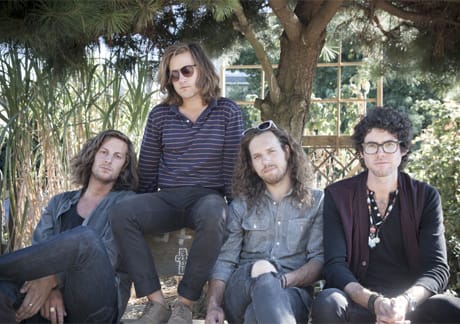Yukon Blonde's self-titled debut finally brought its members the kind of success they'd craved after years of slogging it out on the Canadian indie scene. Yet when it came time to pen what would become sophomore follow-up Tiger Talk, the Vancouver-based group wanted to do anything but repeat the easy-breezy vibe of their debut. "We had a bunch of songs that sounded like the older stuff," says singer-guitarist Jeff Innes, "but we already made that record."
Instead the group adopted a "do whatever we want" attitude that found them drawing inspiration from some unlikely sources. Innes had been working on a side project he'd jokingly dubbed Fucking Tigers. "It was this really weird, electro, punk-y Ramones-y kind of stuff," he says. "When I was showing the demos of what I'd done and then the stuff that I intended to be for Yukon Blonde, the band was like, 'Well wait, what's this stuff?'"
Innes, along with singer-guitarist Brandon Scott, drummer Graham Jones and bass player John Jeffrey, set to work translating their favourite tracks from the Fucking Tigers demos into something more in line with Yukon Blonde's '70s rock wheelhouse. "They were weird," admits Innes. "Everything was synthesizers and drum machines, so that was really fun to try and figure that out on guitars."
Combining the Fucking Tigers material with songs dating back to sessions for their self-titled record, the quartet hooked up with Colin Stewart, with whom Innes, Scott and Jones worked when they were in previous band Alphababy, to lay down the new album at the Hive studios in Vancouver. The tracks Innes had originally pegged for the band ended up as last year's Fire//Water EP. "Those were the kind of Yukon Blonde songs that were typically Yukon Blonde," he says. "We ended up recording them because we thought they were great songs, but they didn't really work out for the record."
Indulging their love for analog, Yukon Blonde was recorded live off the floor to tape. But the experience proved frustrating. "There were timing issues," recalls Innes. "We didn't use a metronome, we didn't use anything. We kind of set up and played like we were practicing. So there were things on it that were driving us crazy. After we were done recording everything, we got drunk in the studio and we could hear all the tempo changes, everything was too slow or too fast. We were so bummed out."
Consequently, the band "went multi-tracking crazy" this time. "It was fun as opposed to the set-in-stone nature that tape has," Innes says. The relative ease of the recording process reinvigorated the group's relationship with the studio, to the point at where they're already looking to go back in and work on stuff written since Tiger Talk was completed. "We have some new songs and we don't know what the hell they are," he says. But it's fun. We're rolling with the punches right now."
Instead the group adopted a "do whatever we want" attitude that found them drawing inspiration from some unlikely sources. Innes had been working on a side project he'd jokingly dubbed Fucking Tigers. "It was this really weird, electro, punk-y Ramones-y kind of stuff," he says. "When I was showing the demos of what I'd done and then the stuff that I intended to be for Yukon Blonde, the band was like, 'Well wait, what's this stuff?'"
Innes, along with singer-guitarist Brandon Scott, drummer Graham Jones and bass player John Jeffrey, set to work translating their favourite tracks from the Fucking Tigers demos into something more in line with Yukon Blonde's '70s rock wheelhouse. "They were weird," admits Innes. "Everything was synthesizers and drum machines, so that was really fun to try and figure that out on guitars."
Combining the Fucking Tigers material with songs dating back to sessions for their self-titled record, the quartet hooked up with Colin Stewart, with whom Innes, Scott and Jones worked when they were in previous band Alphababy, to lay down the new album at the Hive studios in Vancouver. The tracks Innes had originally pegged for the band ended up as last year's Fire//Water EP. "Those were the kind of Yukon Blonde songs that were typically Yukon Blonde," he says. "We ended up recording them because we thought they were great songs, but they didn't really work out for the record."
Indulging their love for analog, Yukon Blonde was recorded live off the floor to tape. But the experience proved frustrating. "There were timing issues," recalls Innes. "We didn't use a metronome, we didn't use anything. We kind of set up and played like we were practicing. So there were things on it that were driving us crazy. After we were done recording everything, we got drunk in the studio and we could hear all the tempo changes, everything was too slow or too fast. We were so bummed out."
Consequently, the band "went multi-tracking crazy" this time. "It was fun as opposed to the set-in-stone nature that tape has," Innes says. The relative ease of the recording process reinvigorated the group's relationship with the studio, to the point at where they're already looking to go back in and work on stuff written since Tiger Talk was completed. "We have some new songs and we don't know what the hell they are," he says. But it's fun. We're rolling with the punches right now."
